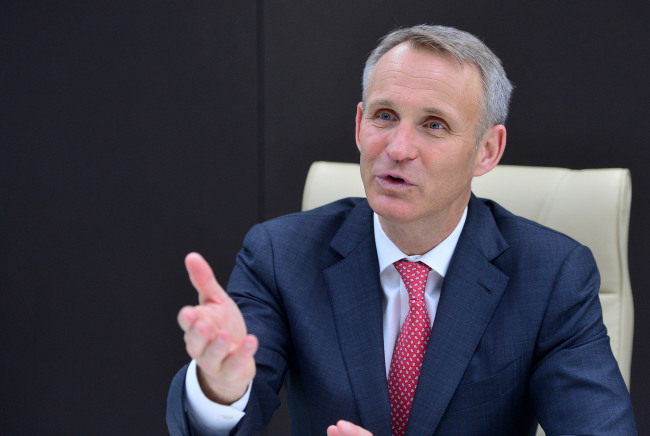The Korean government’s push to create a more flexible labor market, which includes plans to ease employment regulations and expand the use of temporary workers, has been hotly debated in the country over the past few years.
Despite controversy, President Park Geun-hye’s proposed labor reforms are aligned with the structural changes that labor markets around the world are now undertaking, according to the chief of U.S.-based global staffing agency ManpowerGroup.
“We think that Korea’s proposed labor reform that is being discussed now is absolutely a step in the right direction,” ManpowerGroup chairman and CEO Jonas Prising told The Korea Herald in an interview in Seoul.
 |
ManpowerGroup chairman and CEO Jonas Prising (Lee Sang-sub/The Korea Herald) |
If Korea wants to stay globally competitive in the future -- a time when optimized access to human resources is becoming a critical driver of companies’ success -- it must embrace greater labor market flexibility as many developed countries elsewhere have done, he said.
Flexibility in labor markets refers to how quickly and efficiently a company can adjust its workforce in line with changing circumstances. The human resources expert believes this notion will determine a country’s ability to optimize output in an increasingly competitive and volatile economy.
According to the World Economic Forum, Korea -- where most workers expect lifetime employment, annual pay hikes and seniority-based promotion -- ranked 121 out of 140 countries in terms of labor market flexibility.
More importantly, employment flexibility must be complemented by forms of unemployment protection -- safety nets for those unemployed or in job transitions provided by both the state and the corporate sector, Prising said.
According to the OECD 2015 Employment Outlook, around one-third of Korea’s workforce are not full-time workers. Though youth employment is relatively low, at 11 percent, the proportion of those aged 15-25 who are unemployed yet not undergoing education or training is relatively high.
Prising believes the government could provide safety nets like subsidies or insurance for workers who are unemployed or in the process of moving jobs -- measures already taken by European countries such as France and Germany -- while companies should take on a more active role in training their workforce to become more competitive in any setting.
If properly implemented, responsible flexibility can help lower youth unemployment as well, a key problem for Korea, he said. “High youth employment is closely tied to countries that have high barriers to exit, where there is no easy way to get in and out of labor markets.”
Companies are often unable to hire young employees to a greater degree, because they are already overstaffed as well as unable to dismiss those who may not hold the right skillsets under current labor standards, the HR expert explained.
As efforts are underway to lower such job entry barriers, Prising advised prospective workers to engage in the workforce in any form, whether it is a temporary, part-time, freelance or dispatch profession, in order to increase their value in the job market.
The notion of lifelong employment is becoming outdated, Prising said, warning those who would rather stay unemployed than to accept alternative forms of employment other than a full time job. “The share of the nontraditional (not full time) workers will increase over time because organizations need the flexibility.”
He further urged modern workers to embrace the notion of “lifelong learning” -- a value that is increasing in importance today when immense opportunities await those possessing the “right skills.”
“While working for a company, make sure that you are accessing training and other experiences that improve your skills portfolio. If you’re between jobs, make sure that you are using your skills,” Prising said.
“If Korea wants to stay as strong as it is today for the next generations, and not just the next five years, (efforts to build more flexible employent systems) are necessary steps that align with what we see in other countries that want to stay and become more competitive.”
By Sohn Ji-young (
jys@heraldcorp.com)






![[Herald Interview] 'Trump will use tariffs as first line of defense for American manufacturing'](http://res.heraldm.com/phpwas/restmb_idxmake.php?idx=644&simg=/content/image/2024/11/26/20241126050017_0.jpg)
![[Exclusive] Hyundai Mobis eyes closer ties with BYD](http://res.heraldm.com/phpwas/restmb_idxmake.php?idx=644&simg=/content/image/2024/11/25/20241125050044_0.jpg)
